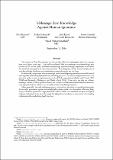| dc.contributor.author | Bitansky, Nir | |
| dc.contributor.author | Brakerski, Zvika | |
| dc.contributor.author | Kalai, Yael | |
| dc.contributor.author | Paneth, Omer | |
| dc.contributor.author | Vaikuntanathan, Vinod | |
| dc.date.accessioned | 2017-08-23T19:25:34Z | |
| dc.date.available | 2017-08-23T19:25:34Z | |
| dc.date.issued | 2016-10 | |
| dc.identifier.isbn | 978-3-662-53640-7 | |
| dc.identifier.isbn | 978-3-662-53641-4 | |
| dc.identifier.issn | 0302-9743 | |
| dc.identifier.issn | 1611-3349 | |
| dc.identifier.uri | http://hdl.handle.net/1721.1/111007 | |
| dc.description.abstract | The notion of Zero Knowledge has driven the field of cryptography since its conception over thirty years ago. It is well established that two-message zero-knowledge protocols for NP do not exist, and that four-message zero-knowledge arguments exist under the minimal assumption of one-way functions. Resolving the precise round complexity of zero-knowledge has been an outstanding open problem for far too long.
In this work, we present a three-message zero-knowledge argument system with soundness against uniform polynomial-time cheating provers. The main component in our construction is the recent delegation protocol for RAM computations (Kalai and Paneth, TCC 2016B and Brakerski, Holmgren and Kalai, ePrint 2016). Concretely, we rely on a three-message variant of their protocol based on a key-less collision-resistant hash functions secure against uniform adversaries as well as other standard primitives.
More generally, beyond uniform provers, our protocol provides a natural and meaningful security guarantee against real-world adversaries, which we formalize following Rogaway’s “human-ignorance” approach (VIETCRYPT 2006): in a nutshell, we give an explicit uniform reduction from any adversary breaking the soundness of our protocol to finding collisions in the underlying hash function. | en_US |
| dc.description.sponsorship | National Science Foundation (U.S.) (Award CNS-1350619) | en_US |
| dc.description.sponsorship | National Science Foundation (U.S.) (Award CNS-1413964) | en_US |
| dc.language.iso | en_US | |
| dc.publisher | Springer-Verlag | en_US |
| dc.relation.isversionof | http://dx.doi.org/10.1007/978-3-662-53641-4_3 | en_US |
| dc.rights | Creative Commons Attribution-Noncommercial-Share Alike | en_US |
| dc.rights.uri | http://creativecommons.org/licenses/by-nc-sa/4.0/ | en_US |
| dc.source | MIT Web Domain | en_US |
| dc.title | 3-Message Zero Knowledge Against Human Ignorance | en_US |
| dc.type | Article | en_US |
| dc.identifier.citation | Bitansky, Nir et al. “3-Message Zero Knowledge Against Human Ignorance.” Hirt, M. and Smith, A., editors. Theory of Cryptography. TCC 2016. Lecture Notes in Computer Science 9985 (2016): 57–83 © 2016 International Association for Cryptologic Research | en_US |
| dc.contributor.department | Massachusetts Institute of Technology. Computer Science and Artificial Intelligence Laboratory | en_US |
| dc.contributor.department | Massachusetts Institute of Technology. Department of Electrical Engineering and Computer Science | en_US |
| dc.contributor.mitauthor | Bitansky, Nir | |
| dc.contributor.mitauthor | Vaikuntanathan, Vinod | |
| dc.relation.journal | Theory of Cryptography | en_US |
| dc.eprint.version | Author's final manuscript | en_US |
| dc.type.uri | http://purl.org/eprint/type/ConferencePaper | en_US |
| eprint.status | http://purl.org/eprint/status/NonPeerReviewed | en_US |
| dspace.orderedauthors | Bitansky, Nir; Brakerski, Zvika; Kalai, Yael; Paneth, Omer; Vaikuntanathan, Vinod | en_US |
| dspace.embargo.terms | N | en_US |
| dc.identifier.orcid | https://orcid.org/0000-0001-8361-6035 | |
| dc.identifier.orcid | https://orcid.org/0000-0002-2666-0045 | |
| mit.license | OPEN_ACCESS_POLICY | en_US |
| mit.metadata.status | Complete | |
